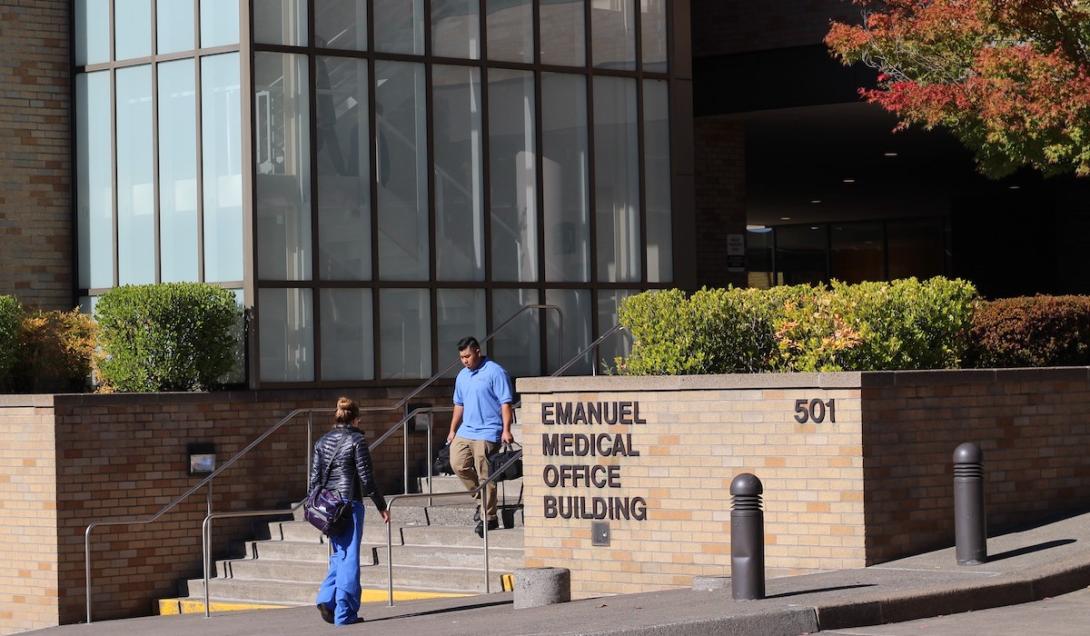
The Legacy Health hospital system has agreed to pay a $1.25 million fine for repeatedly violating the state’s meal and rest break rules and pledges to obey the law in the future, the Oregon Bureau of Labor & Industries announced Tuesday.
Legacy has also agreed to pay an additional fine of $1 million if it fails to meet compliance terms over the next three years, according to the state.
The deal settles a labor dispute that has simmered for years and entails a much lighter penalty than Legacy originally faced. In 2021 the state levied fines of $8.7 million against Legacy, which the non-profit contested. Legacy had said it could be liable for as much as $100 million in fines from BOLI, blaming rules it claimed were unfair and unconstitutional.
The Portland-based six-hospital chain in 2022 appealed BOLI’s fines to U.S. District Court in Portland, arguing BOLI’s meal and break rules were invalid and financially difficult to comply with. But a judge tossed out the case last year, saying Oregon’s rules were not in federal jurisdiction.
BOLI’s rules set out the length and frequency of meal breaks. Responding to many complaints from nurses and other staff at Legacy hospitals about violations, BOLI audited samples of Legacy’s personnel records at four Legacy Oregon hospitals. The agency in 2021 imposed $8.7 million in fines for violations in 5,766 instances at the four hospitals in 2016 and 2017.
The newly announced settlement resolves alleged violations at Legacy’s Good Samaritan, Mount Hood, Meridian Park and Emanuel hospitals.
Legacy will be subject to a three-year probation and annual audits, and failure to comply will result in escalating civil penalties, starting at $50,000 at each facility that fails to comply with the law, according to the state.
Legacy must also provide training to employees to underscore “the importance of workplaces free from retaliation, so anyone can speak up for their rights and the rights of their co-workers,” the state said.
“Maintaining fair and lawful employment practices, including providing appropriate meal and rest breaks, is fundamental to protecting the rights of workers,” said BOLI Commissioner Christina Stephenson in a statement. “This settlement agreement reflects our dedication to ensuring compliance and promoting a safe work environment, free from retaliation for all Oregon workers.”
A Legacy spokesperson issued a statement through a spokesperson that expressed appreciation for BOLI's “cooperation in resolving this matter ... Legacy is committed to ensuring that our employees receive all the meal and rest breaks they are entitled to so that they can better care for patients and avoid the high levels of burnout currently seen among healthcare workers nationwide.”
Legacy had argued that the National Labor Relations Act preempts parts of Oregon’s meal break law and rules, and that the state rules impose an “onerous” burden on the 14,000-employee system, arguments that the federal judge dismissed.
The state’s meal and break rules are based on eight-hour shifts, but in today’s hospital workplace, nurses often work 12-hour shifts.
“Some employees are forced to take a meal break in mid-morning at a time that is unhealthy for them, inconvenient for them, uncomfortable for them, and at times leads to physical discomfort and hunger during the remaining eight or more hours of their shift,” Legacy’s lawyers argued, adding that under the rules, many nurses must take their meal break at roughly the same time, which jeopardizes patient care.
Legacy’s violations consist mainly of providing nurses and other clinical workers with meal breaks outside the window specified by the rules.
BOLI's fine notifications show that the hospitals also allegedly failed to provide some workers any meal breaks at all, or provided shorter meal breaks than the 30 required minutes. And some hospitals failed to provide required rest breaks, according to the notifications.
Legacy argued that it would be too costly for it to hire more nurses to cover for nurses who were taking breaks in compliance with the BOLI break schedule.
Under Oregon law, Legacy must follow BOLI’s meal and rest break rules because Legacy nurses are not unionized. Under the law, if nurses are unionized – as they are at many of Oregon’s other hospital systems - the nurses and the hospital administrations are free to set their own meal and rest break rules, which they often do. Legacy had accused BOLI of pressuring it to unionize, but has since seen a surge of organizing that could make it easier for it to avoid violating state rules.

